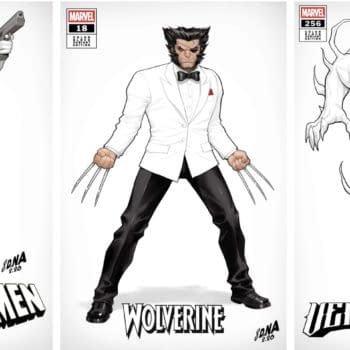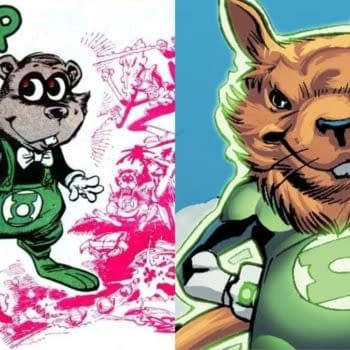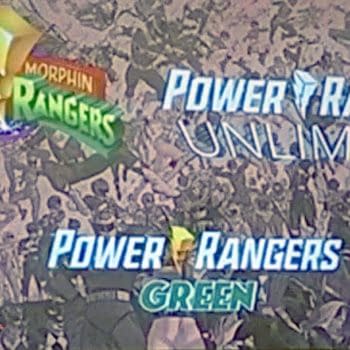Posted in: Comics | Tagged: comics review, heck, zander cannon
Zander Cannon's Heck Harrows The Hell Out Of Hell
It was my favourite book from San Diego Comic Con. It felt like a shoo-in for an Eisner nomination next year. And luckily Hannah Means-Shannon, senior New York Correspondent for Bleeding Cool, seems to agree. She writes;
Zander Cannon's graphic novel Heck, which appeared serialized alongside Kevin Cannon's Crater XV in their digital comics magazine Double Barrel has been collected into its own landscape format hard-back edition as of June from Top Shelf, though you can also receive the book in digital format as desired. It was being snapped up and held aloft like a kind of trophy at San Diego Comic Con, and featured in Top Shelf's announcements in their industry panel where some of the artwork projected on a large screen caused meaningful pauses as if something alien and painfully fascinating had landed.
If you've turned up late to the party, as I have, you're in for some thrills, grimaces, and maybe a few snuffly tears, or if you've read Heck in serialized form, I suggest you now sit down and read it cover to cover in a single go, if you can handle it without having some kind of emotional epiphany that makes your friends and family wonder what on earth has happened to you (or if that's the kind of week you're going for, carry on).
Heck began as a challenge for the 144-Hour Graphic Novel Project wherein Zander Cannon completed several 12-page chapters in single 12-hour sessions on Saturdays, but when that format broke down for himself and other participants (Saturdays are a commodity that can't always be wrangled into work-time), he found he had a narrative on his hands that he just couldn't set aside without seeing it through to the bitter end. The fact that it was, for the most part, written and drawn in a speedy fashion is hard to process when you're actually reading it since the concepts and characters seem so intricately intertwined and emotionally significant.
The graphic novel follows Hector Hammerskjöld's return to his hometown to clear up his late father's estate, where he discovers a gateway to Hell in the basement of his occult enthusiast Dad's spooky house and decides to turn a profit on the infernal opportunity. Through routine visits to Hell to clear up unfinished business with the dead on behalf of clients, Hector ("Heck") subjects himself to all manner of peril and becomes an expert in the pathways of the underworld. When he takes up an assignment for an old flame, Amy, to deliver a letter to her deceased husband, he can't help carrying a torch for her, even over the River Styx.
What follows is a mediation on relationships, and a pretty eviscerating investigation of the role of a hero, all wrapped up in a Seventh Seal-like plunge into the darker aspects of human nature. Cannon accomplishes this by taking his characters, here Heck and side-kick Elliot, step by step through the circles of Hell a la Dante with less of the redemptive atmosphere of the renaissance classic. That's not to say that the story is not an assessment of human redemption from one's own selfish choices, but Heck is a more ambiguous figure than Dante's fictionalized self, and Heck's Beatrice, Amy, may be less than snow white in her own virtues.
Heck, visually, is presented as something of a Doc Savage adventurer, stolid, a former football star who realizes that he has never lived up to his glory days. If he avoided introspection in his youth, he's forced into self-analysis through his journey, and his reactions are never predictable nor are his experiences soft-pedalled. That's what makes Heck such an emotional roller-coaster for readers: ideals are smashed, tarnished human nature held up in an unforgiving spotlight, and the forces that drive anyone on a mission are whittled down to their most basic and least comfortable realities. Cannon does all of this in a dynamic ink-brushed style that holds back from anything remotely ornamental. It's as if the brutal honesty of the subject matter inspires him to remain stark in his art style. Cannon's depictions of Hellish locations like the city of Dis, and characters like Geryon, the Minotaur, and masses of suffering souls, are simply rendered but endlessly inventive in a kind of cultural shorthand. He creates fascination in nearly every panel and makes full use of claustrophobic close-ups and distant vistas to suggest the breadth of the apocalyptic landscape of Hell and the psychological intensity of the experience for characters moving through it.
Two narrative structures that Cannon employs that make the book so readable are neatly divided chapters with amusing (but often significant) titles and something based on one of the premises of the book: the fact that Heck can speak to Amy while in Hell via her conscience in the past, tied to locations he visits. This enables the narrative to jump between points in Amy's past, and in a way Heck's own, before returning to Heck's progress, a descent, in Hell. Of course it's not all about the mission. Instead Heck's progress is tied to his own gradual revelations about himself, and about the flimsy heroic stance he's carried since his days as a football hero, made more pointed by his relationship with adoring underling Elliot. This unfolding is one of the greatest strengths of the book, and what makes this book so unique is how far Cannon takes this analysis, right down the bedrock of personality for Heck. It's a tortuous ride, but an enlightening one. It leaves the reader with the distinct impression of having been on their own harrowing journey into the darkest aspects of ourselves, into the things we hardly dare admit about our own self-regard and our own actions in life.
Heck is one of the most interesting and soul-plumbing graphic novels of 2013. Here's hoping that it gets the critical attention it deserves. It's genesis proves again that many of the greatest works in comics start off as experiments for creators who are willing to push their own comfort zone well into scary places to tell stories that resonate with readers. If there's a Virgil in this story, guiding Heck through his journey, as Virgil guided Dante, then it's Zander Cannon, and he couldn't have been a more insightful conductor on such treacherous paths.
Hannah Means-Shannon senior New York Correspondent at Bleeding Cool, writes and blogs about comics for TRIP CITY and Sequart.org, and is currently working on books about Neil Gaiman and Alan Moore for Sequart. She is @hannahmenzies on Twitter and hannahmenziesblog on WordPress. Find her bio here.














